Key takeaways:
- Body signals, such as hunger and fatigue, are crucial for understanding and responding to our physical and emotional needs.
- Healthy eating significantly impacts energy levels, mental clarity, and emotional well-being, helping in disease prevention.
- Mindful eating enhances the meal experience by fostering awareness of hunger cues and improving digestion and satisfaction.
- Cravings can indicate nutritional deficiencies or emotional states, and understanding them can lead to healthier eating choices.
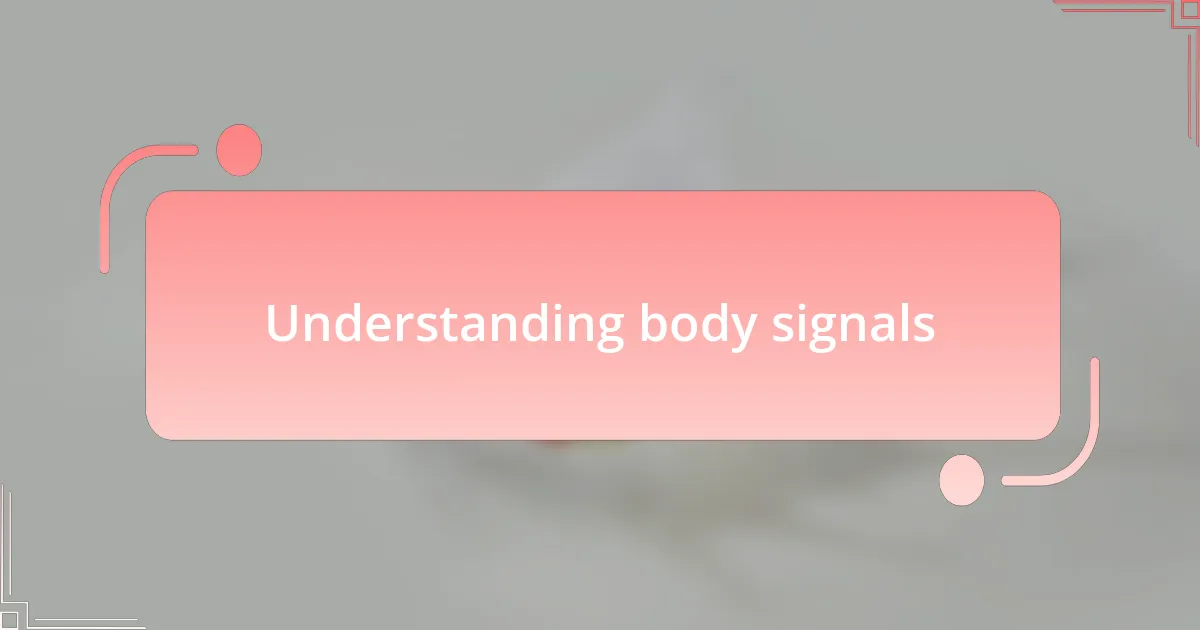
Understanding body signals
Body signals are the body’s way of communicating its needs and responses to both internal and external stimuli. I remember a time when I ignored my fatigue, thinking I could push through another workout. It didn’t take long for my body to demand rest, reminding me just how vital it is to listen to those whispers of exhaustion before they turn into shouts of burnout.
Sometimes, I find it intriguing how often we overlook our hunger cues. There have been moments when I felt a pang of hunger but dismissed it, attributing it to simply being bored or stressed. Reflecting on those instances, I realize that tuning into these signals might not only satisfy my nutritional needs but also enhance my mood and energy levels throughout the day.
It’s important to recognize that not all body signals are simply about hunger or tiredness. I’ve often felt an uneasy flutter in my stomach when overwhelmed, indicating it’s time to slow down and reassess my priorities. Have you ever felt a similar sensation? Understanding these subtler signals can provide valuable insights into our emotional state and well-being, guiding us toward a more balanced and healthy lifestyle.
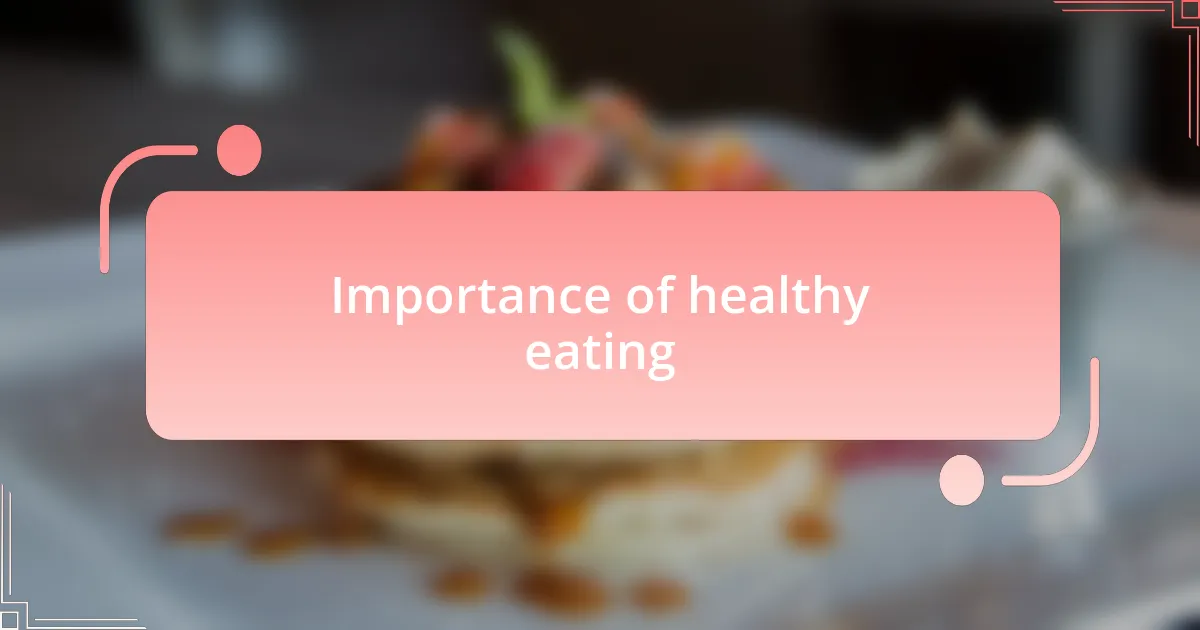
Importance of healthy eating
Healthy eating is the foundation of overall well-being. I’ve seen firsthand how making thoughtful food choices can enhance my energy levels and mental clarity. For instance, after switching to a diet rich in whole grains and fresh vegetables, I noticed an immediate improvement in how I felt throughout the day. Isn’t it fascinating how simply changing what we put on our plates can transform our mood and productivity?
Moreover, the impact of healthy eating extends far beyond physical health. I recall a challenging period in my life when stress felt overwhelming; during that time, I discovered the comfort of nourishing foods. Rather than reaching for the usual junk snacks, I opted for fruits and nuts. To my surprise, I felt more emotionally balanced and equipped to face my challenges. Have you ever noticed how what you eat affects your emotions? Taking care of our bodies through nutritious eating can genuinely shape our mental landscape.
Additionally, healthy eating plays a crucial role in disease prevention. I think back to my grandmother, who prioritized her diet and enjoyed a robust health into her 90s. It’s a poignant reminder that what we consume today can lay the groundwork for future health outcomes. Isn’t it empowering to know that more of life’s joys—be it running after a grandchild or simply feeling vibrant—can stem from the choices we make at mealtime?

Listening to your hunger cues
Listening to your body’s hunger cues is an essential part of nurturing your relationship with food. I remember a time when I used to ignore my hunger signals, thinking I should stick to a strict meal schedule. The shift occurred when I learned to tune into my body instead. I started waiting until I truly felt hungry before eating, and the relief of savoring food in response to my body’s needs was liberating.
I’m often amazed at how essential it is to differentiate between physical hunger and emotional cravings. I used to snack mindlessly while working, mistaking boredom for hunger. By slowly practicing mindfulness during meals and asking myself, “Am I genuinely hungry?” I discovered a new level of satisfaction and enjoyment in my meals. This awareness transformed not just my eating habits, but how I approached cooking and dining.
Taking the time to listen to those subtle cues shapes my eating choices significantly. Some days, my body craves something hearty like a warm bowl of quinoa and vegetables, while other days, I might reach for a refreshing salad. By honoring those cravings, I find that I feel more energized and satisfied. Have you ever noticed how much more fulfilling a meal can be when it aligns with what your body truly wants? When we engage with our hunger signals, we create a more harmonious relationship with food.
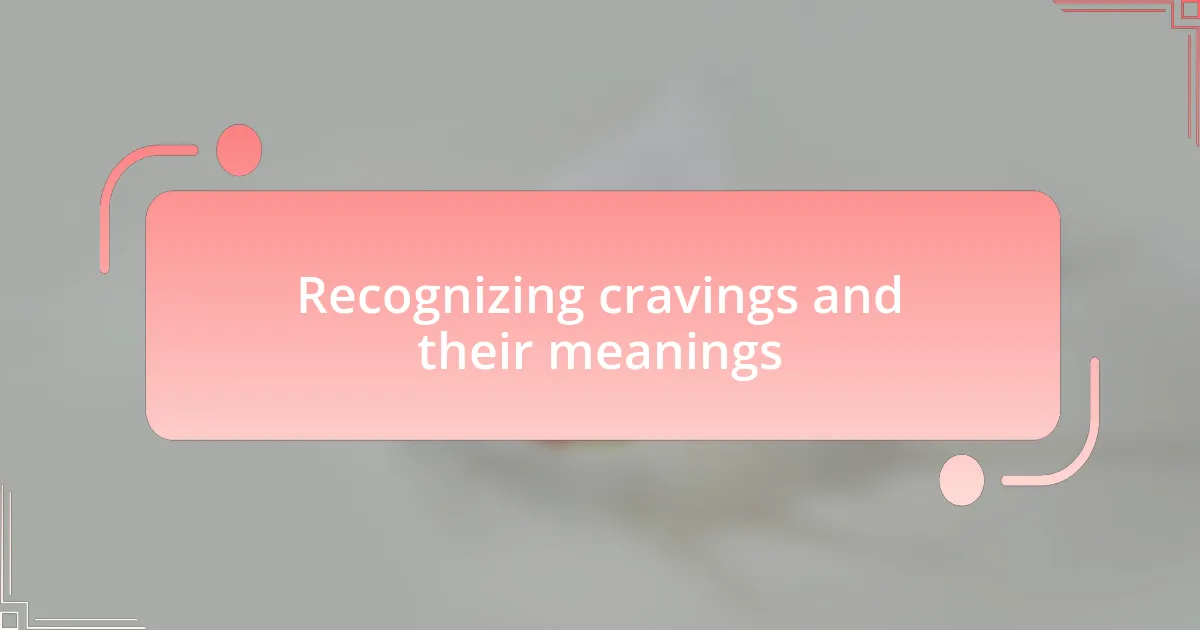
Recognizing cravings and their meanings
Cravings often tell us stories about what our body needs at any given moment. I once found myself longing for chocolate mid-afternoon and initially brushed it off as a guilty pleasure. However, after taking a moment to reflect, I realized that my body was actually craving magnesium, which chocolate contains. This awareness allowed me to choose dark chocolate mindfully, satisfying my craving while listening to my body’s signals.
It’s intriguing how various cravings can hint at deficiencies or emotional states. For instance, after a particularly stressful week, I noticed a strong desire for carbs—a big bowl of pasta seemed irresistible. I learned that often, when we’re feeling overwhelmed, our body seeks comfort foods to cope with stress. Have you experienced similar cravings during tough times? Recognizing these patterns not only brought clarity but also helped me make healthier choices that aligned with my emotional well-being.
When I started paying attention to my cravings, I noticed that sometimes my body craves a particular texture rather than a specific food. There have been days when I felt drawn to crunchy snacks, leading me to choose carrots or apples instead of chips. This shift not only quenched my craving but also left me feeling satisfied and proud of honoring my body’s needs. How about you? Have you explored the deeper meanings behind your own cravings? Understanding them can transform your eating experience and foster a stronger connection to your body.
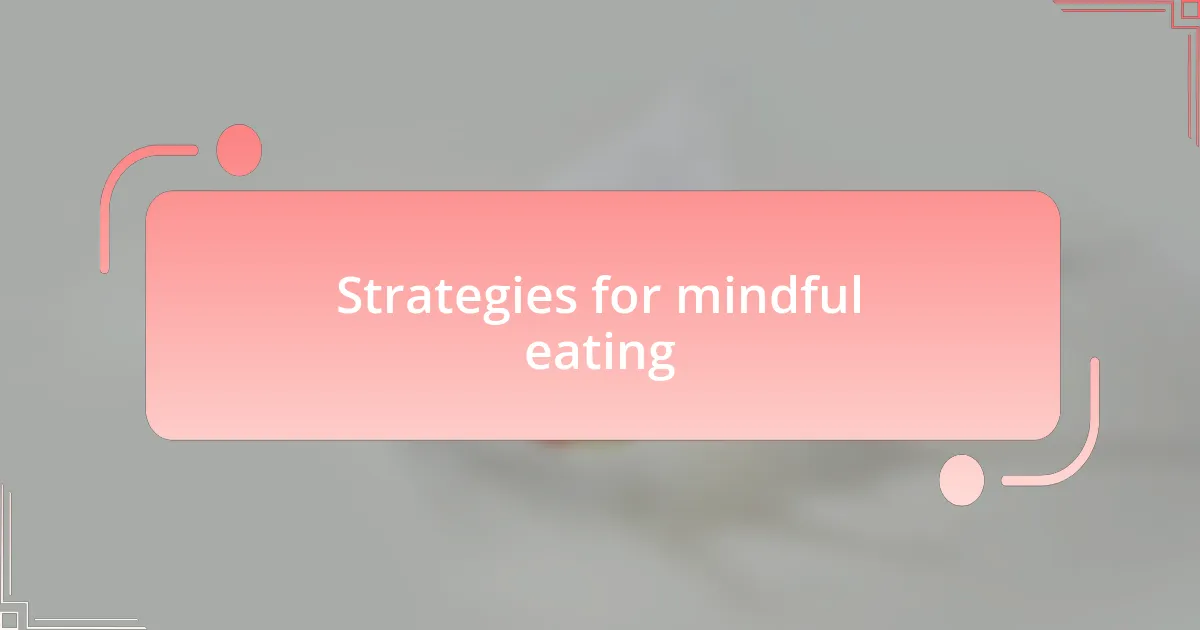
Strategies for mindful eating
Mindful eating is all about being present during our meals. I remember a time when I sat down for lunch, distracted by my phone. I barely registered the flavors or textures of my food. After realizing how much I missed out on, I decided to put my device away and focus solely on my meal. The act of truly savoring each bite transformed not just my eating experience, but also how I felt afterward—much more satisfied and energized.
Another strategy I’ve embraced is setting aside the right environment for eating. Once, during a hectic evening, I rushed through dinner while multitasking. By the end, I felt bloated and unfulfilled. Now, I try to create a calming space, perhaps with soft lighting and soothing music, for meals. This simple shift makes me more attuned to my body’s signals, allowing me to recognize when I’m full before I overindulge.
Lastly, I’ve found that slowing down helps immensely. I used to wolf down meals in a matter of minutes, not giving myself time to process how my body felt. By intentionally pausing between bites—taking a breath or sharing a thought with someone at the table—I’ve noticed that I can gauge my hunger and fullness better. Have you tried this approach? It might just change the way you connect with both your food and your body.
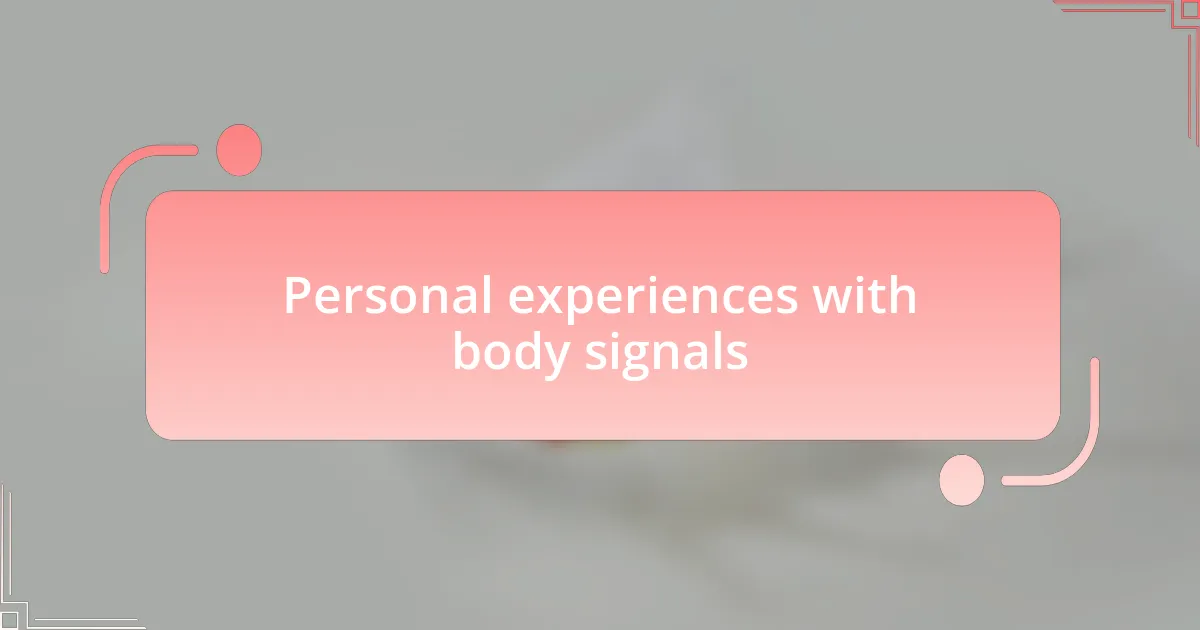
Personal experiences with body signals
Listening to my body’s signals has been a game changer. I recall a day when I ignored my hunger cues while working late. Instead of taking a break to eat, I pushed through, thinking I could get more done. By the time I finally sat down for dinner, I was ravenous, leading to overeating and feeling sluggish all evening. Now, I prioritize checking in with my hunger levels, which helps me eat more intuitively.
There’s also the emotional side of tuning into my body. One evening, I felt a heaviness in my stomach after indulging in a rich dessert. Initially, I brushed it off, but it lingered, reminding me of the importance of moderation. Listening to that discomfort taught me to appreciate treats without going overboard. Have you ever experienced that unsettling feeling after a meal? It’s a clear signal that our bodies are communicating with us in ways we shouldn’t ignore.
On another occasion, I decided to experiment with listening to my cravings. Instead of labeling them as “good” or “bad,” I embraced them—when I craved fresh vegetables, I honored that need. It was liberating to see how my body naturally guided me toward healthier choices. Have you ever noticed how your desires can sometimes reflect what your body truly needs? In my experience, honoring those signals has led me to feel lighter and more vibrant.